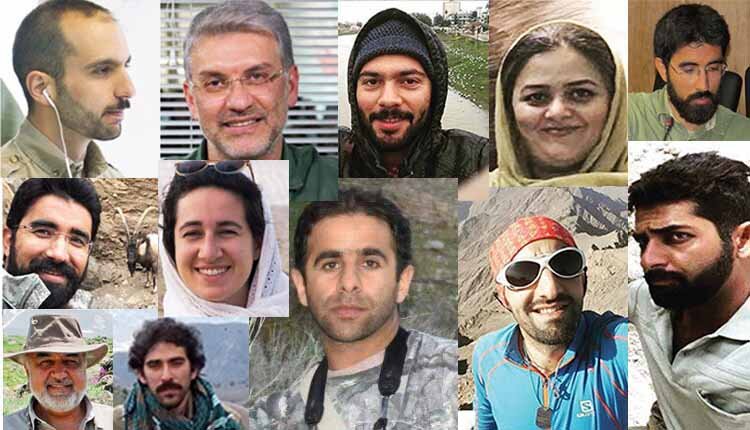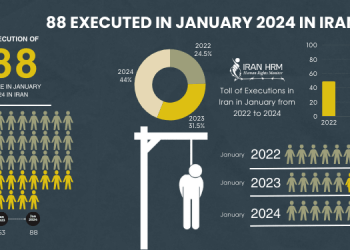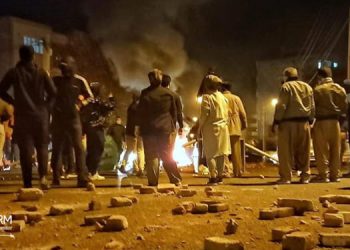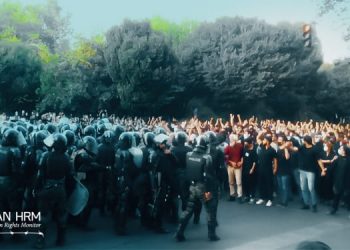Introduction
October was replete with numerous instances of human rights violations as Iran continued its rampage of domestic crackdown.
Iranian authorities have a dismal report card of at least 22 executions this month, including the execution of a woman despite being only 17 at the time of alleged crime.
Reports from inside Iran also indicate the intelligence and security forces continued to make arrests of Ahvazi Arabs, including several children and women, in what appears to be an escalating crackdown in Iran’s Khuzestan province.
News has detailed a large number of truck drivers in various provinces have reportedly been detained for participating in the strike, with a spokesperson for the judiciary threatening “heavy punishment.”
The news of Iranian environmentalists facing charges which could carry the death penalty stirred controversy across Iran. The Tehran prosecutor claimed that four of the eight detained Iranian environmentalists have been charged with “sowing corruption on Earth”, which could be punishable by death.
Furthermore, Jafari Dolatabadi said that the legal cases against the detainees have been already prepared and are ready to be presented to courts.
Eight environmentalists, Niloufar Bayani, Houman Jokar, Sepideh Kashani, Amir Hossein Khaleqi, AbdolReza Kouhpayeh, Taher Qadirian, Sam Rajabi and Iranian-American dual citizen Morad Tahbaz have been held in temporary custody by the Islamic Revolutionary Guards Corps’ Intelligence Organization since last January.
Human Rights Watch has called on Iran to immediately release eight environmental activists who’ve been detained since January unless authorities “can produce evidence to justify the charges against them and guarantee a fair trial.”
Iran Human Rights Monitor’s Monthly Report – October 2018 reviews the executions, arrests and cruel sentences issued for people, the arbitrary murders, deaths in custody, inhuman treatment and cruel punishments, prison conditions and persecution of religious minorities.
The right to life
- Executions
Iran Human Rights Monitor has registered 22 executions which were carried out in the prisons of Urmia, Birjand, Qazvin, Rajaei Shahr, Shahre Kord, Isfahan, Maragheh, Ilam, Shirvan, Sirjan, Zahedan and Ardebil.
Iran executed a female victim of domestic and sexual violence who was convicted of killing her husband when she was a minor.
Zeinab Sekaanvand was hanged on October 2 in Urmieh central prison in West Azerbaijan province.
She was just 15 when she was forced to marry her abusive husband and at 17 she was jailed for his murder in 2012 after she confessed under torture.
About the horrific execution of 24-year old Sekaanvand, Amnesty International’s Middle East Research and Advocacy Director, said: “Her execution is profoundly unjust. The fact that her death sentence followed a grossly unfair trial makes her execution even more outrageous.”
Philip Luther added: “Zeinab Sekaanvand said that, soon after she was married at 15, she sought help many times from the authorities about her violent husband and alleged that her brother-in-law had raped her repeatedly.
“Instead of investigating these allegations, however, the authorities consistently ignored her and failed to provide her with any support as a victim of domestic and sexual violence.”
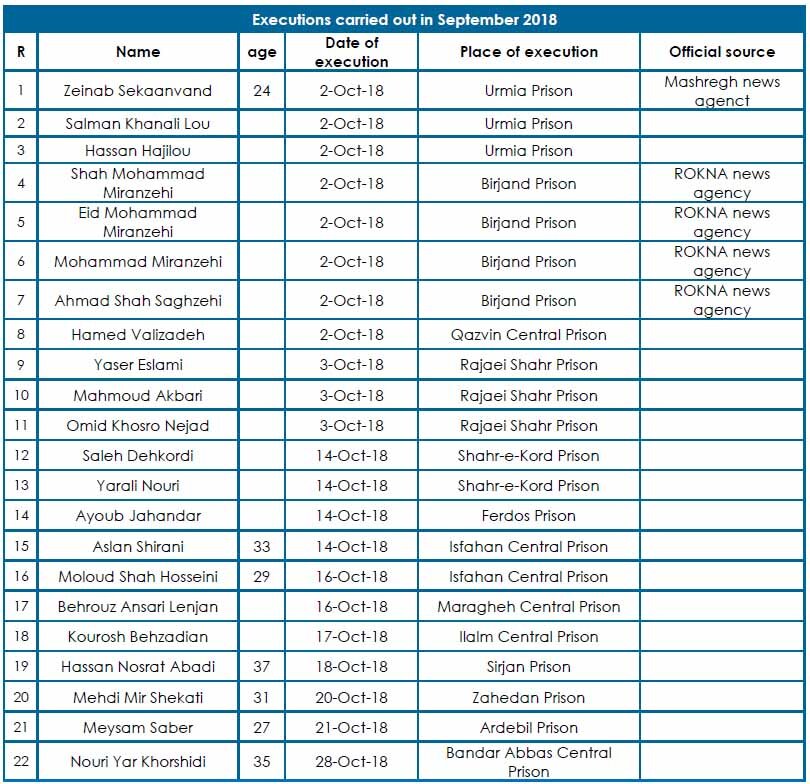
- Arbitrary murders
Iran Human Rights Monitor recorded 11 arbitrary murders including killing of Kurdish porters and merchants and Balichi men.
Authorities take harsh measures against porters
under the pretext of smuggling while the widespread aspect of smuggled goods and
currency in Iran confirms this reality that the “small smugglers,” who are
constantly arrested and even killed by state police, are actually a very small
piece of a very large puzzle.
Inhuman treatment and cruel punishments
Iran’s judiciary issued flogging for 60 people and handed down a hand for one person.
- Fifteen staff members of the HEPCO manufacturing company in Markazi Province, Iran, have been issued suspended prison and lashing sentences for striking for unpaid wages, reported the state-funded Iranian Labor News Agency (ILNA) on October 28, 2018.
“It should be noted that some of these workers… were labor representatives negotiating with the employer,” said the ILNA report. “The workers say they want the new Labor Minister [Mohammad Shariatmadari], who had given assurances about the freedom to organize labor protests, to step in and prevent their prosecution.”
The workers convicted of “disturbing the peace” at the Heavy Equipment Production Company (HEPCO) are: Majid Latifi, Behrouz Hasanvand, Hamidreza Ahmadi, Amir Houshang Pour Farzanegan, Morteza Azizi, Hadi Fazeli, Abolfazl Karimi, Farid Kodani, Majid Yahyaie, Amir Fatahpour, Yaser Gholi, Amir Farid Afshar, Mehdi Abedi, Ali Maleki and Berouz Valashajardi.
- Pedram Pazireh, graduate student in culture &media affairs & deputy UTUCI secretary, was sentenced to a 7-year prison sentence and 74 lashes for organizing a ceremony commemorating the national Student Day. The verdict was issued by the notorious judge, Mohammad Moghiseh.
- A court in the central city of Arak, issued prison sentences and lashes for 11 protesters arrested during the December/January uprising that spread to over 140 cities across the country. These individuals are facing charges such as “disrupting public order and peace by taking part in illegal rallies.”
Arrests
Iran Human Rights Monitor registered 2442 arrests across the country including 543 politically motivated arrests, 11 arrests on religious and ethnic grounds, and 1888 arbitrary arrests.
- Human Rights groups accused Tehran of carrying out a weeks-long campaign of “repression” against Ahwazi Arab ethnic minority in Khuzestan province, southern Iran, including arrests of children and women.
The wave of detentions follows a deadly armed attack on a military parade in the city of Ahvaz. Amnesty International believes that the timing suggests that the Iranian authorities are using the attack in Ahvaz as an excuse to lash out against members of the Ahwazi Arab ethnic minority, including civil society and political activists, in order to crush dissent in Khuzestan province.
- Prominent teachers’ rights activist Hashem Khastar, who mysteriously disappeared October 23 in the city of Mashhad in northeast Iran, remained in detained by the Islamic Republic’s Intelligence Ministry at a psychiatric hospital.
“He was completely healthy and after retiring spent many of his days farming. The only medication he consumed were blood pressure pills. Khastar being hospitalized in an emergency section of a special facility for psychiatric patients means [authorities] injected a special type of medication with the intention of killing him, or he had been severely injured under torture or during his arrest,” Sedighe Maleki, the wife of Mr. Khastar said.
The unionist representing teachers in Iran’s northeastern Razavi Khorasan province, was the latest of several education activists to be detained in Iran this year while promoting teachers’ rights to engage in union activities and protest peacefully for better working conditions.
- More than 261 truck drivers were detained during the course of the strike and threats of death were issued by government officials who labeled the drivers “road bandits”, which carries severe punishment and sometimes the death sentence in Iran. A judiciary official also warned truck drivers holding the nationwide strike over pay and high prices of “harsh penalties” if they continue their protests, state media said.
Mohseni Ejei warned truck drivers who have continued their protests for higher wages and affordable parts despite several rounds of arrests.
“Harsh penalties await those who … block lorry traffic on roads,” he said, according to IRNA.
General prosecutor Mohammad Jafar Montazeri said last week that protesting drivers may face death sentences under stern laws against highway robbery, the state broadcaster IRIB reported.
Before this in October, a court in Qazvin Province called for the death penalty against 17 striking truck drivers in the north western province.
- At least four teachers were arrested in connection with a two-days long peaceful sit-in for teachers’ and education rights in Iran while an unknown number of teacheres were summoned to Intelligence Ministry’s offices in Tehran, Qazvin, Bojnourd, Saqqez, Marivan, Kermanshah and Aligoudarz.
The Iranian Teachers’ Trade Association (ITTA) reported on October 14 that the head of its secretariat, Mohammad Reza Ramezanzadeh, and a teacher, Mohammad Ghanbari, were arrested after the strike was launched on October 13, 2018.
On October 11, Abbas Vahedian, a teacher and ITTA member, was arrested at his home in Mashhad on the eve of the sit-in strike by security agents who raided his house, confiscated his personal belongings and took him to an unknown location.
In Aligoudarz, Lorestan Province, Amin Azimi, also an ITTA member, was freed on October 16, two days after being arrested.
Teachers in several Iranian cities did not show up to class on October 13 to join a peaceful sit-in protesting poor living conditions, problems with their jobs and heavy security measures imposed in their schools.
Prisoners
- More than 70 political prisoners went on hunger strike for over a week in Urmia (Orumiyeh) Central Prison despite pressures and hollow promises provided by the prison authorities.
These inmates launched their hunger strike on October 14, protesting an attack by the prison’s special guard units targeting ward 12 where political prisoners are held. The prison guards beat them severely and dragged many to solitary confinement. This attack took place after the prisoners were protesting the beating of another inmate and his transfer to incommunicado. A number of the political prisoners suffered severe injuries.
- Farhad Meysami, a defender of Iranian women’s rights who has been jailed in Tehran is in poor health due to a hunger strike.
Meysami, a medical doctor who was detained in July for protesting against laws forcing Iranian women to wear the hijab, has been on a hunger strike since August 1 and has lost 18 kilograms while being held in a medical clinic at Tehran’s Evin prison, where he is being force-fed intravenously.
Meysami has vowed not to end his hunger strike until he and two other prominent activists arrested for protesting the hijab are released.
- Golrokh Iraee, Atena Daemi and Maryam Akbari Monfared, three women political prisoners in the women’s ward of Evin Prison were deprived of their family visitations for three weeks since October 2, 2018.
Prison agents that the illegal verdict was handed down because of the three women political prisoners’ verbal argument with prison guards at the visitation hall where they chanted slogans.
The three women political prisoners, Golrokh Iraee, Atena Daemi and Maryam Akbari Monfared, demanded to see the verdict, however, the head of the women’s ward said it had been verbally communicated to them by Charmahali, the Prison Administrator, and the Prosecutor’s Office.
Violation of other rights
On October 23, Tehran Chief of Police announced that “255 operations were carried out in Tehran”, in which 240 people including 45 juveniles were arrested.
Hossein Rahimi said that the detainees were accused of “troublemaking, destroying public property and instigating public opinion on the internet” among other things.
He further announced that 210 shops including café’s, gyms and 67 parks were raided during 255 operations which were carried out in 48 hours.
A video was also posted by ISNA state-run News Agency which purported to show the Tehran Chief of Police “interrogating” a young man on the street.
The young man was shot by the police after attacking a police station with a machete.
When asked why he attacked the police station, the young man says that he did it in retaliation to the death of his uncle by the police, who died after 12 hours in police custody.

